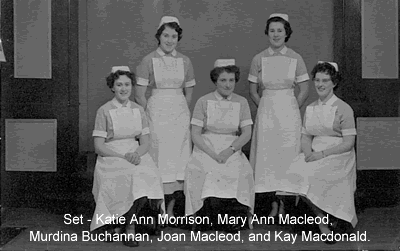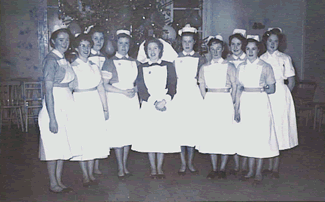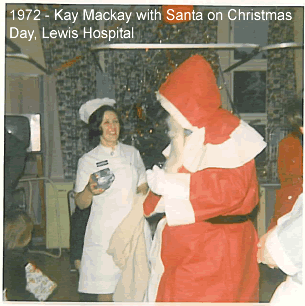| Looking Back Celebrating 73 years of the National Health Service in the Western Isles |
To
be a nurse was not a childhood dream of mine. It was only after two years
at a domestic science college that I decided that catering and cooking
were not for me.
 |
After a family meeting about my future, I vaguely remarked that I’d
quite like to be a children’s nurse. My father promptly replied that
I’d much better do my general training first and then do children’s
nursing. Without warning or discussion he told me the next day that I
had an appointment with the Matron of the Lewis Hospital, Miss P Campbell.
Before I had time to draw breath I was in the uniform of a Nursing Auxiliary
in August 1958 with the prospect of starting my training in January 1959.
My first day will remain vividly in my memory forever. I had to report
to the Assistant Matron who I could tell was very busy and could see me
far enough. In those days there was no pharmacist in the Lewis Hospital
so the Assistant Matron did all the dispensing, ordering and making sure
the wards had all their supplies. I arrived in the middle of the dispensing
day!
She took me upstairs to the changing room and produced the necessary dress
called a wrapper, starched apron, belt, cap and muffs. Yes, even the lowly
Nursing Auxiliary was kitted out suitably starched! Nobody told me to
bring safety pins, studs for collar and hairgrips to keep a cap on.
The poor lady went berserk and berated me on my foolishness (first of
many, even on my first day). She went off in search of said pins, grips,
studs, etc. and much to my confusion, consternation and anxiety, did not
return for two hours. I had lots of thoughts during these two hours. Do
I stay? Do I go searching for her? Do I run home? However, common sense
prevailed and I sat waiting. She returned and pulled and pushed and tucked
me into shape, although I looked a comic sight.
I was taken into the Surgical Ward, probably because it was the first
ward she came to, and she handed me over to a Student Nurse to teach me
what to do. Thus began my nursing career and on that first afternoon I
didn’t think I would return the following day but I retired from
nursing in December 2004, 45 years later, after a very fulfilling and
varied career as a general nurse. I never did go on to do children’s
nursing.
At that time nursing hierarchy was absolute. The nurse three months ahead
of you was your boss and told you what to do, what to say and had complete
domination over you. If you were lucky you got a senior who was kind and
understanding and as I recall most of them were. Staff Nurses and Sisters
didn’t really have much input into your education as a Nursing Auxiliary,
as you were so low down in the hierarchy that you were invisible.
 |
| Medical
Ward , Christmas 1959, left to right, Ishbel Macarthur, Kay Macdonald, Annie Mary ?, Babsie Matheson, Mairi C Morrison, Shan Maciver, Peggie Macleod, Mary Ann Macleod, Katie Ann Morrison, and Peggie Morrison. |
We
had lots to do every day. Cleaning was our constant work, with lots of
soap, water and foul-smelling disinfectant to assist us. The wards were
Florence Nightingale wards with beds down both sides and a female and
male ward.
Every day the beds down one side of the ward got pulled out into the middle
of the ward and behind them was cleaned and damp dusted. The lights, radiators,
external pipes, chairs, beds, tables, screens were all washed thoroughly.
Everything was then put back in place and the other side of the ward was
done the following day. The ward maid did the floor and they washed and
polished that horrible old brown linoleum and you were in deep trouble
if you trod on her wet floor or newly polished surface.
The sluice was my domain and I took great pride in washing and polishing
the stainless steel bed-pans and all the equipment in there. This was
my escape, I was  safe
in here, washing and polishing, no senior nurse or Sister could ask me
to do anything that scared me. The rubber sheets and draw sheets had to
be washed, dried and powdered and put on wooden rollers. If they were
folded, the rubber cracked and this caused problems for the patients who
lay on them, i.e. bed sores. All the linen had to be taken out of the
linen skips and counted - so many sheets, so many draw sheets, etc. All
blood and body fluid stained linen had to be sluiced with cold water before
sending to the laundry. We had no latex gloves to protect our hands and
so, very often, the skin on our hands was hacked and cracked and believe
me were very sore.
safe
in here, washing and polishing, no senior nurse or Sister could ask me
to do anything that scared me. The rubber sheets and draw sheets had to
be washed, dried and powdered and put on wooden rollers. If they were
folded, the rubber cracked and this caused problems for the patients who
lay on them, i.e. bed sores. All the linen had to be taken out of the
linen skips and counted - so many sheets, so many draw sheets, etc. All
blood and body fluid stained linen had to be sluiced with cold water before
sending to the laundry. We had no latex gloves to protect our hands and
so, very often, the skin on our hands was hacked and cracked and believe
me were very sore.
And so went my first day, a lot of time cleaning,
washing and sluicing but not a lot of time spent with patients. That came
later after the apprenticeship of the sluice room. So I went home vowing
not to return but I did and funnily enough I cannot remember my second
day!
Kay Mackay